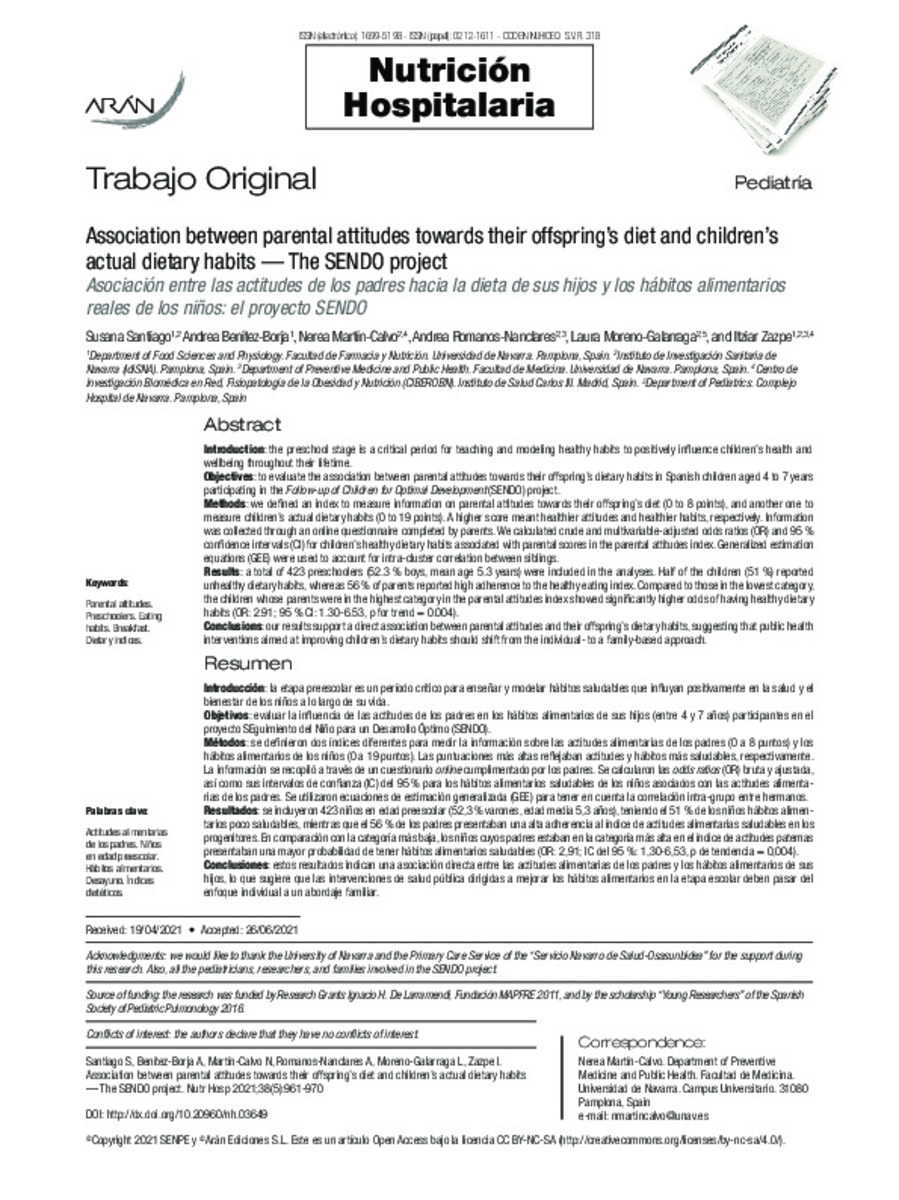Full metadata record
| DC Field | Value | Language |
|---|---|---|
| dc.creator | Santiago, S. (Susana) | - |
| dc.creator | Benítez-Borja, A (Andrea) | - |
| dc.creator | Martin-Calvo, N. (Nerea) | - |
| dc.creator | Romanos-Nanclares, A. (Andrea) | - |
| dc.creator | Moreno-Galarraga, L. (Laura) | - |
| dc.creator | Zazpe, I. (Itziar) | - |
| dc.date.accessioned | 2024-02-20T09:13:44Z | - |
| dc.date.available | 2024-02-20T09:13:44Z | - |
| dc.date.issued | 2021 | - |
| dc.identifier.citation | Santiago, S. (Susana); Benítez-Borja, A (Andrea); Martin-Calvo, N. (Nerea); et al. "Association between parental attitudes towards their offspring's diet and children's actual dietary habits - The SENDO project". Nutrición Hospitalaria. 38 (5), 2021, 961 - 970 | es |
| dc.identifier.issn | 1699-5198 | - |
| dc.identifier.uri | https://hdl.handle.net/10171/69129 | - |
| dc.description.abstract | Introduction: the preschool stage is a critical period for teaching and modeling healthy habits to positively influence children's health and wellbeing throughout their lifetime. Objectives: to evaluate the association between parental attitudes towards their offspring's dietary habits in Spanish children aged 4 to 7 years participating in the Follow-up of Children for Optimal Development (SENDO) project. Methods: we defined an index to measure information on parental attitudes towards their offspring's diet (0 to 8 points), and another one to measure children's actual dietary habits (0 to 19 points). A higher score meant healthier attitudes and healthier habits, respectively. Information was collected through an online questionnaire completed by parents. We calculated crude and multivariable-adjusted odds ratios (OR) and 95 % confidence intervals (CI) for children's healthy dietary habits associated with parental scores in the parental attitudes index. Generalized estimation equations (GEE) were used to account for intra-cluster correlation between siblings. Results: a total of 423 preschoolers (52.3 % boys, mean age 5.3 years) were included in the analyses. Half of the children (51 %) reported unhealthy dietary habits, whereas 56 % of parents reported high adherence to the healthy eating index. Compared to those in the lowest category, the children whose parents were in the highest category in the parental attitudes index showed significantly higher odds of having healthy dietary habits (OR: 2.91; 95 % CI: 1.30-6.53, p for trend = 0.004). Conclusions: our results support a direct association between parental attitudes and their offspring's dietary habits, suggesting that public health interventions aimed at improving children's dietary habits should shift from the individual- to a family-based approach. | es_ES |
| dc.description.sponsorship | the research was funded by Research Grants Ignacio H. De Larramendi, Fundación MAPFRE 2011, and by the scholarship “Young Researchers” of the Spanish Society of Pediatric Pulmonology 2016 | es_ES |
| dc.language.iso | eng | es_ES |
| dc.publisher | Scielo | es_ES |
| dc.rights | info:eu-repo/semantics/openAccess | es_ES |
| dc.subject | Parental attitudes | es_ES |
| dc.subject | Preschoolers | es_ES |
| dc.subject | Eating habits | es_ES |
| dc.subject | Breakfast | es_ES |
| dc.subject | Dietary indices | es_ES |
| dc.title | Association between parental attitudes towards their offspring's diet and children's actual dietary habits - The SENDO project | es_ES |
| dc.type | info:eu-repo/semantics/article | es_ES |
| dc.description.note | Este es un artículo Open Access bajo la licencia CC BY-NC-SA | es_ES |
| dc.identifier.doi | 10.20960/nh.03649 | - |
| dadun.citation.endingPage | 970 | es_ES |
| dadun.citation.number | 5 | es_ES |
| dadun.citation.publicationName | Nutrición Hospitalaria | es_ES |
| dadun.citation.startingPage | 961 | es_ES |
| dadun.citation.volume | 38 | es_ES |
| dc.identifier.pmid | 34304576 | - |
Files in This Item:
Statistics and impact
Items in Dadun are protected by copyright, with all rights reserved, unless otherwise indicated.






